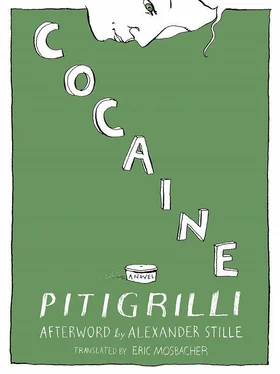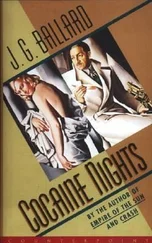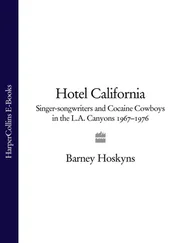“I thought you were looking at my legs,” she said with a sidelong glance.
“That’s how we atheists pray.”
That evening Tito went and prayed in the cabin where those legs came from.
The sea was calm.
Everyone knows that if a man and woman not united by marriage are found in a compromising situation on board ship, they are in for a great deal of trouble.
That, however, is merely a bright idea thought up by the steamship companies, who never grudge persons of standing their entertainment. Not only do they supply a gypsy orchestra (gypsy orchestras are the caricaturists of music), a library, religious services and a daily newspaper giving the latest news (that was received before the ship sailed), and a gym; they also had the inspiration of subjecting contraband love affairs to severe penalties in order to make the idea more exciting to passengers in the luxury class, the first class and, provided a suitable tip is offered, the second class also.
This does not apply to passengers in the third class, where it would be too immoral, and offenders are subject to immediate arrest.
“You pay court to all the women,” Tito’s neighbor at table said to him. This neighbor was a rabbi from Warsaw who was returning from South America with a chanteuse who was as delicate as a flower and with a large sum of money collected for the Zionist cause.
“Yes,” Tito replied, it’s like dueling. For army officers dueling is an offence, but refusing to fight a duel is an even greater offence. It’s the same with women. If you tell a woman you want her, she’s offended, but if you don’t want her she’s even more offended.”
“You must have had a great many women,” the rabbi said. “You must know them very well.”
“I have had mistresses,” Tito modestly confessed, “but it’s quite wrong to suppose that a man who has had many women must have a profound understanding of feminine psychology; it’s just as wrong as it would be to suppose that an art gallery attendant would make a good art critic. Besides, what do you really need to make a conquest? Nothing whatever. All you have to do is to let her make a conquest of you. Men never choose. They think they choose, but in fact they’re chosen. A man paying court to a woman doesn’t try to seize her, he simply puts himself in a position where he can be seized. If you don’t believe me, look at the animal kingdom. The male is nearly always more beautiful than the female, which means that it’s the male who is chosen. The female is not sought after, so, unlike the male, she has no need to be beautiful. Look how striking the male bird of paradise is, and what a poor thing the female is.”
“That’s true,” the rabbi admitted, pulling his moustache horizontal. “But the great difficulty is not getting women, it’s leaving them.”
“I disagree,” Tito replied. The man doesn’t leave the woman, he puts himself in a condition to be left. In exceptional cases in which he wants to break the link there’s an infallible way of withdrawing gracefully, and it’s this: say to her point-blank, in threatening tones: “I know everything.”
“Everything about what?” the rabbi asked in surprise.
“Believe me, the most innocent woman always has something in her recent or distant past that can be the everything to which you refer.”
Two English misses sitting facing them listened in silence, opening their eyes wide, like heifers at the passing of an express train.
The rabbi from Warsaw was a very likeable man. He laughed aloud at the caricature of the Bible that Tito once produced for his benefit when he was under the influence of cocaine, and told him that the money he had collected in America would serve to revive the kingdom of Israel in Palestine and enable Jews scattered all over the world to resettle there.
“And will you go to Palestine?” Tito asked.
“No, I won’t,” the rabbi replied, “I’m too well off in Warsaw.”
“But what about the persecutions, the pogroms?”
“That’s all humbug,” the rabbi replied with a laugh. “Those are rumors spread by us Polish Jews. We want it to be believed that Jews are badly off in Poland to prevent others from coming there.”
Tito’s senses were excited by the sun, the smell of the calm sea, the sensuality inherent in all transatlantic liners, the uterine quality with which the brasses, the upholstery, the decks, the big saloons and long corridors are impregnated. In the course of the twenty-two-day voyage he satisfied his senses ten times with five different women; and in doing so he almost wiped out the memory of Maud, which grew fainter with every turn of the screw. Love (erotic attraction), like the force of gravity, diminishes proportionately to the square of the distance.
When they drew close to land, Tito regretted the prospect of saying goodbye to the Dutch young lady with her perfect curves that were as sweet as her father’s jam; to the respectable lady who already had a son as big as that because she had married when she was still a child; to the professor’s two daughters, who were as alike and unlike as a tangerine and an orange; to the lady with the luminous legs who wanted a motto for her garters; and to the drily humorous Warsaw rabbi’s mistress, who was as delicate as a flower and as stupid as an ox.
He regretted all these women whom he would never see again.
But he did not regret Cocaine, his Cocaine, whom he never wanted to see again, Cocaine who at that moment was either writhing deceitfully in the arms of the multimillionaire rastaquero whose face would surely secrete castor-oil if you squeezed it, or on the hollow chest of the student Arguedos, who was looking in vain for a half-price bed in a sanatorium.
But as soon as he was in the train to Turin, all that was left of the voyage was some cigarettes given him by a generous passenger and some tropical sunburn.
And his thoughts returned to Cocaine, his little Cocaine whom he had left on the other side of the Atlantic; his Cocaine whose skin had a perfume not to be found on any other woman, his Cocaine on whose epidermis scents acted more miraculously than on any other female skin, Cocaine, Maud, the woman from whom he fled and to whom he returned, the poison-woman whom he hated and loved, for she was simultaneously his ruin and his delight, his suffering and his exaltation, his most delightful death and his most terrible life.
In Turin, cradle of the Risorgimento and guardian of the Holy Shroud, he saw the usual faces and the usual things. At dusk hundreds of swifts still tangled and untangled in disorderly patterns as they flew round the towers of the Palazzo Madama; and the usual people got on the usual trams at the usual stops at the usual times. He met a number of friends and a number of women who, when he came to think of it, had been his. Sometimes we meet women whose lovers we have been for an hour or a month, and we hardly remember having dedicated to them the solemn ceremony conducted by the industrious donkey with the Egyptian woman at Port Said, though the memory of that highly important ceremony ought automatically to spring to our mind. How insignificant it is. Nothing of her flesh, her electricity, her breath, has remained in us, nothing whatever. As soon as it was over, while she dressed, we started chatting again about other, unimportant things. So all that was left was a taste no stronger than that left in our mouths by a cigarette after we have put it in an ashtray. But if we discover that our current love has been someone else’s, if only for five minutes, we feel an intolerable pang, even after many years. The act to which she was subjected by others seems to us to be an indelible stain; we feel that her blood has been polluted, her flesh irreparably soiled, violated, adulterated by that act, by that very same act that we hardly remember carrying out with the woman we now pass in the street.
Читать дальше



